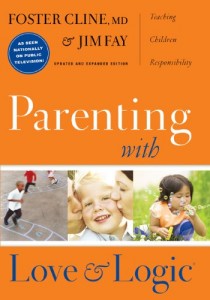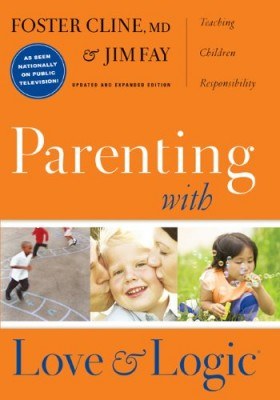Parenting with Love and Logic: Teaching Children Responsibility
 In their popular parenting book Parenting with Love and Logic, psychologist Dr. Foster Cline and educator Jim Fay suggest that parenting is best done with the outcome in mind. (See below for bios of Cline and Fay). Parents want children to grow up into adults that make responsible decisions. As Gandhi is reported to have said, “The means are the ends in the process of becoming.” Applied to parenting, the strategy used in raising up kids is shaping the adults they will become. If a parenting strategy relies upon issuing commands, the child is being steered toward being an adept follower of someone else’s decisions. A brand new adult with little experience thinking, choosing a course of action, and negotiating the consequences is in serious danger of making life-alteringly poor decisions.
In their popular parenting book Parenting with Love and Logic, psychologist Dr. Foster Cline and educator Jim Fay suggest that parenting is best done with the outcome in mind. (See below for bios of Cline and Fay). Parents want children to grow up into adults that make responsible decisions. As Gandhi is reported to have said, “The means are the ends in the process of becoming.” Applied to parenting, the strategy used in raising up kids is shaping the adults they will become. If a parenting strategy relies upon issuing commands, the child is being steered toward being an adept follower of someone else’s decisions. A brand new adult with little experience thinking, choosing a course of action, and negotiating the consequences is in serious danger of making life-alteringly poor decisions.
But what if the child could gain experience in thinking, deciding, and benefiting or learning from outcomes within the safe confines of parents’ boundaries? Cline and Fay’s model of parenting is based upon the parents making clear the acceptable options available to a child, allowing the child to make a decision, and benefitting or suffering from the consequences of their decision (when the child’s safety is not at risk). Love and Logic parents make use of questions: “Would you like ____ or would you rather ____?” These parents consistently place the responsibility of thinking on the children rather than over-functioning on behalf of the children. They love their children too much to shield them from the consequences of their decisions.
On the other hand, over-functioning parents rely on commands: “Do this.” “Don’t do that.” “Don’t do that either!” This command/obey/punish pattern sets the stage for regular battles of will – the parent’s versus the child’s. Every time a command is issued a line is drawn in the sand. Will the child obey or disobey? Consider what happens to the parents’ emotions each time the defies the command. It is common for the tension to ratchet up and up into anger and a poor choice of punishment. Not only do these parents expend energy thinking for the child but they also tend to expend an avoidable amount of negative emotional energy on the child.
This is not to say that there is not a place for obedience in Cline and Fay’s system. The parents still set the boundaries. However, because they have the end goal in sight, these parents realize that the present conflict is not the entire ballgame. Crossing the boundaries or making poor decisions garner undesirable consequences. The natural consequences of a poor decision are indispensable guides for growing a child into a responsible adult. Love and Logic parents love their children too much to rob them of valuable consequences.
To learn more about the Love and Logic style of parenting, pick up a copy of Cline and Fay’s very readable Parenting with Love and Logic. Included are over 40 examples how Love and Logic parents handle common, stressful parenting situations.









